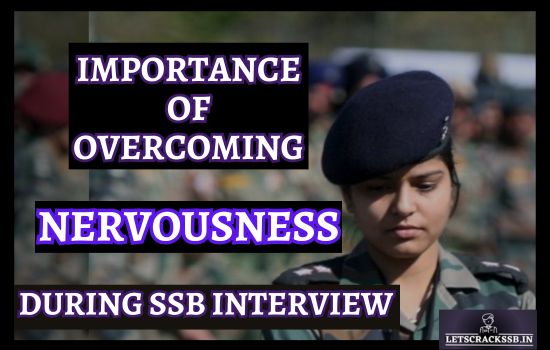Getting through an SSB interview can be scary, but don’t worry! This article has practical tips to help you overcome nervousness in the SSB interviews. Learn how to build confidence, understand important strategies, and succeed in your SSB interview.
The Impact of Nervousness on SSB Interview Performance
Nervousness plays a pivotal role in influencing an individual’s performance during an SSB (Services Selection Board) interview. It casts its shadow on various facets, encompassing communication skills, decision-making prowess, and even body language.
Communication Skills – The unsettling feeling of nervousness in the SSB Interview can hinder individuals from expressing themselves clearly or articulating their thoughts with ease. Verbal stumbling, rapid speech, and overlooking crucial details become common pitfalls. Given the importance of effectively conveying ideas during the interview, overcoming nervousness is paramount.
Decision-Making Abilities – Nervousness has the potential to cloud one’s ability to make logical decisions under pressure, leading to indecisiveness, confusion, or rushed judgments. As SSB interviews frequently involve scenarios testing candidates’ decision-making acumen, overcoming nervousness becomes indispensable to showcasing analytical skills.
Body Language – In the realm of effective communication, body language holds considerable sway in conveying confidence and competence. However, nervousness may manifest in visible signs like fidgeting, avoiding eye contact, or adopting a slouched posture. Gaining control over and projecting positive body language is vital to leave a lasting impression on assessors.
How to Improve Body Language for SSB Interviews?
Recognizing the Common Causes of Nervousness
Understanding the roots of nervousness empowers individuals to tackle and overcome their anxieties effectively.
Fear of Failure: Dealing with Pressure to Perform
The fear of failure tends to intensify in high-stakes situations like SSB interviews. Candidates may grapple with concerns about falling short of expectations, be it their own or others. Overcoming this fear involves shifting the focus from the outcome to the effort exerted, embracing the chance for personal growth and improvement.
Lack of Preparation: Overcoming the Anxiety of the Unknown
Unpreparedness can fuel nervousness in the SSB Interview, particularly when candidates face unfamiliar interview questions or scenarios. Thorough research into the interview process, engaging in mock interviews, and acquainting oneself with potential questions can assuage this anxiety and bolster confidence.
Self-Doubt and Lack of Confidence: Building a Strong Mindset
Self-doubt and a dearth of confidence can undermine one’s performance in an SSB interview. Cultivating a growth mindset, seeking constructive feedback, and celebrating personal achievements serve as effective strategies to bolster confidence and dispel self-doubt. Viewing failure as a stepping stone to success further fortifies one’s mindset.
The Benefits of Overcoming Nervousness in the SSB Interview
Conquering nervousness in the SSB interviews yields several benefits that significantly influence candidates’ performance and leave a lasting impression on assessors.
Enhanced Performance and Increased Confidence – Overcoming nervousness in the SSB Interview empowers candidates to showcase their skills and qualities confidently, enhancing their prospects for selection.
Improved Decision-Making Abilities Under Stress – By eliminating nervousness, candidates can demonstrate their ability to make sound decisions under pressure, a coveted skill in SSB interviews.
Establishing a Positive Impression on Assessors – Confidently addressing nervousness enables candidates to create a positive impression, presenting themselves as potential leaders and team players—qualities highly valued in SSB interviews.
Practical Tips to Overcome Nervousness in the SSB Interview
Conquering nervousness in the SSB Interview demands practical strategies that aid effective preparation and anxiety management during the interview process.
Preparing Effectively to Alleviate Anxiety
To alleviate anxiety, candidates must invest time and effort into thorough preparation.
In-Depth Research on the SSB Interview Process – A comprehensive understanding of the SSB interview process enables candidates to anticipate and familiarize themselves with various stages, tasks, and expectations, fostering strategic planning and confidence.
Mock Interviews and Practice Exercises – Simulating the interview environment through mock interviews and practice exercises helps candidates acclimate to the process. Practising diverse scenarios and receiving feedback enhances skills and mitigates nervousness.
Familiarizing Yourself with Potential Questions and Scenarios – Researching and compiling a list of potential questions and scenarios prepares candidates to respond confidently during SSB interviews. Developing well-thought-out responses and practising them increases preparedness and confidence.
Managing Nervousness in the Interview Room
Once inside the interview room, candidates can employ various techniques to manage nervousness in the SSB Interview effectively.
Relaxation Techniques: Deep Breathing and Meditation – Deep breathing exercises and meditation contribute to calming the mind and regulating breathing. Focusing on deliberate inhales and exhales helps reduce anxiety and promotes relaxation.
Positive Visualization and Self-Affirmation – Visualizing a positive outcome and adopting self-affirmation techniques assist candidates in building confidence and alleviating nervousness. Picturing success and reciting positive affirmations foster a positive mindset before and during the interview.
Effective Stress Management Strategies – Implementing stress management strategies, including time management, prioritization, and maintaining a balanced lifestyle, significantly reduces nervousness. Adequate rest, physical activities, and pursuing hobbies counteract stress and contribute to overall well-being.
Improving Communication Skills to Combat Nervousness
Enhancing communication skills aids candidates in expressing thoughts effectively during the interview.
Active Listening and Clear Articulation – Active listening is crucial for effective communication. Attentively listening to the interviewer’s questions ensures more accurate and succinct responses. Clear articulation further ensures assessors understand the candidate’s perspective.
Non-Verbal Communication: Eye Contact and Body Language – Maintaining eye contact and employing positive body language contributes to a confident and engaging presence. Confidence and professionalism are conveyed through eye contact while avoiding fidgeting or slouching enhances overall communication.
Practising Structured Responses and Effective Expression – Practicing structured and concise responses that showcase knowledge, experiences, and opinions effectively enhances confidence and combats nervousness. Emphasizing strengths and highlighting relevant examples contributes to a confident and composed presentation.
Building Resilience and Confidence
Building resilience and confidence is an ongoing process requiring conscious effort and self-reflection.
Developing a Growth Mindset and Embracing Failure – Adopting a growth mindset allows candidates to view challenges and failures as opportunities for growth. Embracing failure as a natural part of the learning process cultivates resilience.
Seeking Constructive Feedback and Continuous Improvement – Seeking constructive feedback from mentors or those familiar with the SSB interview process offers valuable insights for improvement. Candidates should embrace feedback, identify growth areas, and make necessary adjustments to enhance performance.
Building Confidence through Self-Celebration and Reflection – Celebrating achievements and reflecting on strengths, past successes, and positive experiences contribute to building confidence. Acknowledging progress fosters a positive mindset.
Utilizing Time Management Techniques
Efficient time management helps candidates alleviate stress and stay organized throughout the SSB interview process.
Planning and Prioritizing Tasks – Developing a detailed plan and prioritizing tasks ensures candidates allocate sufficient time for preparation and self-care. Breaking down the interview process into manageable sections with clear timelines enables confident engagement.
Breaking Down the Interview Process – Breaking down the interview process into distinct stages prevents candidates from feeling overwhelmed. Focusing on one step at a time directs energy and attention to each stage individually, managing nervousness in the SSB Interview more effectively.
Maintaining a Balanced Lifestyle and Prioritizing Self-Care – Balanced living is crucial for managing nervousness. Candidates should prioritize self-care activities like exercise, relaxation, and engaging in hobbies, ensuring mental and physical well-being during interview preparation.
The Mistakes to Avoid in Handling Nervousness in the SSB Interview
To conquer nervousness effectively, candidates must be aware of common pitfalls.
Overthinking and Overanalyzing
The Dangers of Dwelling on Negative Thoughts – Excessive focus on negative thoughts or worst-case scenarios can amplify nervousness and impede rational thinking. Candidates must recognize and redirect their thoughts toward more positive and empowering perspectives.
Tips on Shifting Focus and Redirecting Thoughts – Practicing mindfulness and cognitive reframing techniques helps candidates shift their focus away from negative thoughts. By consciously redirecting thoughts toward constructive and optimistic patterns, candidates can manage nervousness in the SSB Interview more effectively.
The Importance of Blank Mind and Present Moment Awareness – Moments of mental silence and being fully present in the interview can alleviate nervousness. Candidates should cultivate a calm and focused mind, avoiding distractions and staying in the present moment to optimize performance.
Nervousness in the SSB Interview – SSB Interview Preparation: 9 Common Mistakes to Avoid
Comparing Yourself with Others
Comparing oneself with others undermines confidence and increases nervousness
The Negative Impact of Comparison – Comparing yourself to others can make you feel not good enough and unsure about yourself. Each candidate is unique, with their own set of skills, experiences, and strengths. Focusing on personal growth and embracing individuality helps candidates overcome nervousness in the SSB Interview and present their authentic selves.
Embracing Individuality and Focusing on Personal Growth – Embracing one’s individuality and recognizing personal strengths fosters confidence. Concentrating on personal progress and continuous growth, instead of comparisons, allows candidates to build confidence.
Finding Inspiration in Others’ Success Stories – Rather than viewing others as competition, candidates can find inspiration in success stories. Learning from others’ achievements cultivates a positive mindset, adapting effective strategies to overcome nervousness in the SSB Interview.
Neglecting Physical and Mental Well-being
Neglecting well-being amplifies nervousness and hinders performance.
The Link Between Nervousness and Lack of Self-Care – Physical and mental well-being are intertwined with emotional stability and self-confidence. Neglecting self-care activities exacerbates nervousness. Candidates should prioritize well-being for optimal performance.
The Importance of Exercise and Adequate Sleep – Regular exercise and sufficient sleep impact mental and physical health positively. Engaging in exercise and maintaining a consistent sleep routine reduce anxiety, improve focus, and promote overall well-being. Integrating these practices into daily life helps manage and conquer nervousness in the SSB Interview.
Seeking Professional Help for Persistent Nervousness or Anxiety – If persistent nervousness significantly hinders daily functioning, seeking professional help from mental health experts or counsellors is crucial. These professionals offer appropriate guidance and support tailored to individual needs.
Successfully conquering nervousness in the SSB interviews involves understanding its impact, addressing root causes, and implementing practical strategies. By enhancing communication skills, building resilience, utilizing time management techniques, avoiding common mistakes, and prioritizing self-care, candidates can present their best selves and increase their chances of success.
Candidates should approach the SSB interview process with a positive mindset, embracing the opportunity for growth and self-improvement. Conquering nervousness is a pathway to personal and professional development, and by adopting effective strategies, candidates can showcase their true potential.
Must Read
- Importance of Current Affairs for SSB Interview | Preparation Strategy
- 6 Tips for Mastering the Psychology Tests at SSB Interviews
- SSB Interview Preparation: 9 Common Mistakes to Avoid
How common is nervousness in the SSB interviews?
Nervousness is prevalent among candidates appearing for SSB interviews due to the pressure and significance of the selection process. However, with proper preparation and effective management techniques, candidates can conquer nervousness and perform at their best.
Are there any quick fixes to overcome nervousness in the SSB Interview?
While no instant fixes exist, strategies and techniques can help individuals manage and overcome nervousness effectively. Quick fixes offer temporary relief, but sustainable solutions involve thorough preparation, confidence-building, and addressing root causes.
How can I build long-lasting confidence before the interview?
Building enduring confidence requires ongoing effort and a combination of strategies. Developing a growth mindset, seeking constructive feedback, celebrating personal achievements, and embracing failure as an opportunity for growth are effective ways. Consistent practice, preparation, and self-reflection contribute to the confidence that lasts beyond the interview process.

